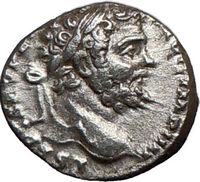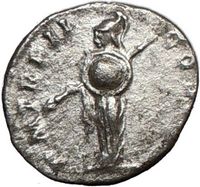|
Septimius Severus - Roman Emperor: 193-211 A.D. -
Silver Denarius 18mm (3.33 grams) Rome mint: 194-195 A.D.
Reference: RIC 49; sear5 #6326; RSC 381
L SEPT SEV PERT AVG IMP IIII, laureate head right.
P M TR P II COS II P P, Minerva standing left with spear & round shield.
You are bidding on the exact item pictured,
provided with a Certificate of Authenticity and Lifetime Guarantee of
Authenticity. Minerva (Etruscan: Menrfa, or Menrva) was the
Roman goddess whom Hellenizing Romans from the
second century BC onwards equated with the Greek
goddess
Athena. She was the virgin goddess of
poetry,
medicine,
wisdom,
commerce,
weaving,
crafts,
magic, and the inventor of
music. She is often depicted with an owl, her
sacred creature and is, through this connection, a symbol of wisdom.
This article focuses on Minerva in ancient Rome and in
cultic practice. For information on Latin
literary mythological accounts of Minerva, which were heavily influenced by
Greek mythology, see
Pallas Athena, where she is one of three virgin
goddesses along with
Artemis and
Hestia, known by the Romans as
Diana and
Vesta.
Etruscan
Menrva
The name "Minerva" is imported from the
Etruscans who called her
Menrva. Extrapolating from her Roman nature, it
is assumed that in
Etruscan mythology, Minerva was the goddess of
wisdom, war, art, schools and commerce. She was the Etruscan counterpart to
Greek
Athena. Like Athena, Minerva was born from the
head of her father, Jupiter (Greek
Zeus).
By a process of
folk etymology, the Romans could have confused
the
phones of her foreign name with those of the
root men- in
Latin
words such as mens meaning "mind", perhaps because one of her
aspects as goddess pertained to the intellectual. The word mens has the
Proto-Indo-European mn- stem, linked
with memory as in Greek
Mnemosyne (μνημοσύνη) and mnestis (μνῆστις:
memory, remembrance, recollection).
Cult
in Rome
Menrva was part of a holy
triad with
Tinia and
Uni, equivalent to the Roman
Capitoline Triad of Jupiter-Juno-Minerva.
Minerva was the daughter of Jupiter.
As Minerva Medica, she was the goddess of medicine and doctors. As
Minerva Achaea, she was worshipped at
Luceria in
Apulia where
votive gifts and arms said to be those of
Diomedes were preserved in her temple.
In
Fasti III,
Ovid called her the "goddess of a thousand works." Minerva was
worshipped throughout Italy, though only in Rome did she take on the warlike
character shared by Athena. Her worship was also taken out to the empire — in
Britain, for example, she was conflated with the local wisdom goddess
Sulis.
The Romans celebrated her festival from March 19 to March 23 during the day
which is called, in the neuter plural,
Quinquatria, the fifth after the Ides of March,
the nineteenth, an
artisans' holiday . A lesser version, the
Minusculae Quinquatria, was held on the Ides of June, June 13, by the
flute-players, who were particularly useful to
religion. In 207 BC, a
guild of poets and actors was formed to meet
and make
votive offerings at the temple of Minerva on
the
Aventine hill. Among others, its members
included
Livius Andronicus. The Aventine sanctuary of
Minerva continued to be an important center of the arts for much of the middle
Roman Republic.
Minerva was worshipped on the
Capitoline Hill as one of the
Capitoline Triad along with Jupiter and Juno,
at the
Temple of Minerva Medica, and at the "Delubrum
Minervae" a temple founded around 50 BC by
Pompey on the site now occupied by the church
of
Santa Maria sopra Minerva facing the
present-day Piazza della Minerva.
L ucius Septimius Severus (or rarely Severus I) (April 11,
145/146-February 4, 211) was a
Roman
general, and
Roman
Emperor from April 14, 193 to 211. He was born in what is now the
Berber part of
Rome's historic
Africa Province. ucius Septimius Severus (or rarely Severus I) (April 11,
145/146-February 4, 211) was a
Roman
general, and
Roman
Emperor from April 14, 193 to 211. He was born in what is now the
Berber part of
Rome's historic
Africa Province. Septimius Severus was born and raised at
Leptis
Magna (modern
Berber, southeast of
Carthage,
modern
Tunisia).
Severus came from a wealthy, distinguished family of
equestrian rank. Severus was of
Italian Roman ancestry on his mother's side and of
Punic or
Libyan-Punic
ancestry on his father's. Little is known of his father,
Publius Septimius Geta, who held no major political status but had two
cousins who served as consuls under emperor
Antoninus Pius. His mother, Fulvia Pia's family moved from
Italy to
North
Africa and was of the
Fulvius gens,
an ancient and politically influential clan, which was originally of
plebeian status. His siblings were a younger
Publius Septimius Geta and Septimia Octavilla. Severus’s maternal cousin was
Praetorian Guard and consul
Gaius Fulvius Plautianus.
In 172, Severus was made a
Senator
by the then emperor
Marcus Aurelius. In 187 he married secondly
Julia
Domna. In 190 Severus became
consul, and in
the following year received from the emperor
Commodus
(successor to Marcus Aurelius) the command of the
legions
in
Pannonia.
On the murder of
Pertinax by
the troops in 193, they proclaimed Severus Emperor at
Carnuntum,
whereupon he hurried to Italy. The former emperor,
Didius Julianus, was condemned to death by the Senate and killed, and
Severus took possession of Rome without opposition.
The legions of
Syria, however, had proclaimed
Pescennius Niger emperor. At the same time, Severus felt it was reasonable
to offer
Clodius Albinus, the powerful governor of Britannia who had probably
supported Didius against him, the rank of Caesar, which implied some claim to
succession. With his rearguard safe, he moved to the East and crushed Niger's
forces at the
Battle of Issus. The following year was devoted to suppressing Mesopotamia
and other Parthian vassals who had backed Niger. When afterwards Severus
declared openly his son
Caracalla
as successor, Albinus was hailed emperor by his troops and moved to Gallia.
Severus, after a short stay in Rome, moved northwards to meet him. On
February
19,
197,
in the
Battle of Lugdunum, with an army of 100,000 men, mostly composed of
Illyrian,
Moesian and
Dacian legions,
Severus defeated and killed Clodius Albinus, securing his full control over the
Empire.
Emperor
Severus was at heart a
soldier, and
sought glory through military exploits. In 197 he waged a brief and successful
war against the
Parthian Empire in retaliation for the support given to Pescennius Niger.
The Parthian capital
Ctesiphon
was sacked by the legions, and the northern half of
Mesopotamia was restored to Rome.
His relations with the
Roman
Senate were never good. He was unpopular with them from the outset, having
seized power with the help of the military, and he returned the sentiment.
Severus ordered the execution of dozens of Senators on charges of corruption and
conspiracy against him, replacing them with his own favorites.
He also disbanded the
Praetorian Guard and replaced it with one of his own, made up of 50,000
loyal soldiers mainly camped at
Albanum, near Rome (also probably to grant the emperor a kind of centralized
reserve). During his reign the number of legions was also increased from 25/30
to 33. He also increased the number of auxiliary corps (numerii), many of
these troops coming from the Eastern borders. Additionally the annual wage for a
soldier was raised from 300 to 500
denarii.
Although his actions turned Rome into a military
dictatorship, he was popular with the citizens of Rome, having stamped out
the rampant corruption of Commodus's reign. When he returned from his victory
over the Parthians, he erected the
Arch of Septimius Severus in Rome.
According to Cassius Dio,
however, after 197 Severus fell heavily under the influence of his Praetorian
Prefect,
Gaius Fulvius Plautianus, who came to have almost total control of most
branches of the imperial administration. Plautianus's daughter,
Fulvia Plautilla, was married to Severus's son, Caracalla. Plautianus’s
excessive power came to an end in 205, when he was denounced by the Emperor's
dying brother and killed.
The two following praefecti, including the jurist
Aemilius Papinianus, received however even larger powers.
Campaigns in Caledonia (Scotland)
Starting from 208 Severus undertook a number of military actions in
Roman
Britain, reconstructing
Hadrian's Wall and campaigning in
Scotland.
He reached the area of the
Moray
Firth in his last campaign in Caledonia, as was called Scotland by
the Romans..
In 210 obtained a peace with the
Picts that lasted
practically until the final withdrawal of the Roman legions from Britain,
before falling severely ill in
Eboracum (York).
Death
He is famously said to have given the advice to his sons: "Be harmonious,
enrich the soldiers, and scorn all other men" before he died at Eboracum on
February 4,
211. Upon his death in 211, Severus was
deified by the Senate and succeeded by his sons,
Caracalla
and
Geta, who were advised by his wife
Julia
Domna. The stability Severus provided the Empire was soon gone under their reign.
Accomplishments and Record
Though his military expenditure was costly to the empire, Severus was the
strong, able ruler that Rome needed at the time. He began a tradition of
effective emperors elevated solely by the military. His policy of an expanded
and better-rewarded army was criticized by his contemporary
Dio Cassius and
Herodianus: in particular, they pointed out the increasing burden (in the
form of taxes and services) the civilian population had to bear to maintain the
new army.
Severus was also distinguished for his buildings. Apart from the triumphal
arch in the Roman Forum carrying his full name, he also built the
Septizodium in Rome and enriched greatly his native city of
Leptis
Magna (including another triumphal arch on the occasion of his visit of
203).
Severus and Christianity
Christians were
persecuted during the reign of Septimus Severus. Severus allowed the
enforcement of policies already long-established, which meant that Roman
authorities did not intentionally seek out Christians, but when people were
accused of being Christians they could either curse
Jesus and make an
offering to
Roman gods, or be executed. Furthermore, wishing to strengthen the peace by
encouraging religious harmony through
syncretism,
Severus tried to limit the spread of the two quarrelsome groups who refused to
yield to syncretism by outlawing
conversion to Christianity or
Judaism.
Individual officials availed themselves of the laws to proceed with rigor
against the Christians. Naturally the emperor, with his strict conception of
law, did not hinder such partial persecution, which took place in
Egypt and the
Thebaid, as
well as in
Africa proconsularis and the East. Christian
martyrs were
numerous in
Alexandria (cf.
Clement of Alexandria, Stromata, ii. 20;
Eusebius, Church History, V., xxvi., VI., i.). No less severe were
the persecutions in Africa, which seem to have begun in 197 or 198 (cf.
Tertullian's Ad martyres), and included the Christians known in the
Roman martyrology as the martyrs of
Madaura.
Probably in 202 or 203
Felicitas and
Perpetua suffered for their faith. Persecution again raged for a short time
under the proconsul
Scapula in
211, especially in
Numidia and
Mauritania.
Later accounts of a
Gallic persecution, especially at
Lyon, are
legendary. In general it may thus be said that the position of the Christians
under Septimius Severus was the same as under the
Antonines;
but the law of this Emperor at least shows clearly that the
rescript of
Trajan[clarification
needed] had failed to execute its purpose.
|


 ucius Septimius Severus (or rarely Severus I) (April 11,
145/146-February 4, 211) was a
ucius Septimius Severus (or rarely Severus I) (April 11,
145/146-February 4, 211) was a